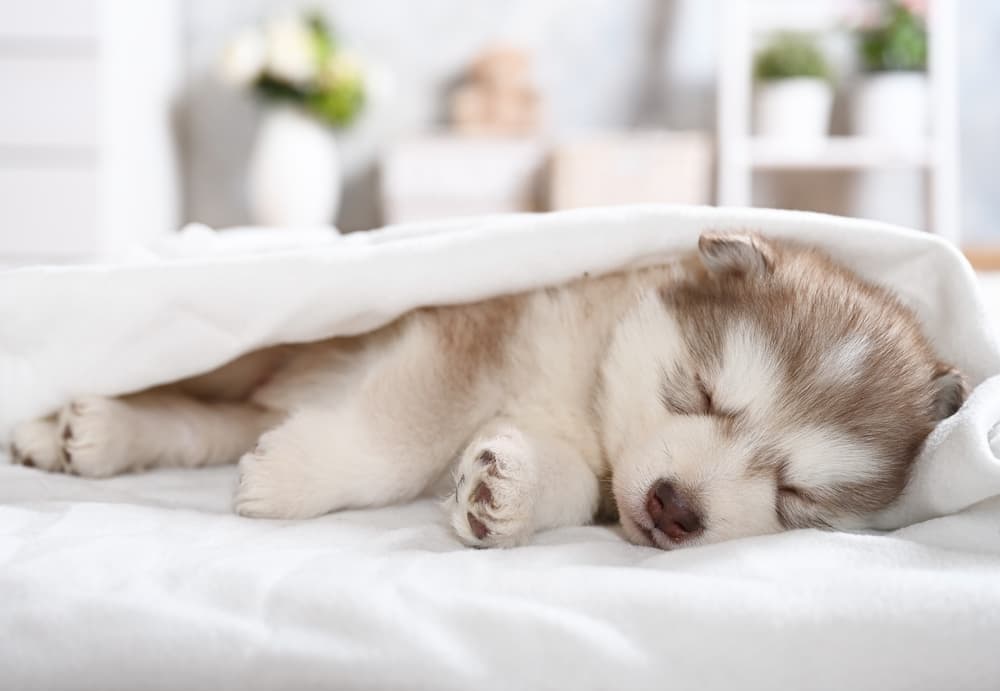Why Is My Puppy Breathing Fast While Sleeping?

Bringing home a puppy is a joyous and fun-filled time. However, there some puppy situations cause anxiety and concern for pet parents.
A common concern is noticing a sweet puppy breathing fast while sleeping. Is this normal? Should you worry?
Read to learn more about your puppy respiration rate and why your puppy might be breathing fast while sleeping. We’ll also cover whether you should be concerned and what to do if you notice this behavior.
Normal Puppy Respiration Rate
The normal respiratory rate for a puppy at rest is between 15-40 breaths per minute. This is higher than an adult dog, which is between 10-30 breaths per minute while resting. It’s important to know this to determine if a puppy is breathing “too fast.”
Puppies take more breaths at rest than adult dogs. This is because they are growing and need more oxygen.
How to Check a Puppy’s Breathing Rate
The best way to evaluate your puppy’s breathing rate is while they are sleeping. This is not the same as lying down – they need to truly be asleep. That way, you know they aren’t breathing quickly because they just finished playing, are excited, are hot, etc.
To figure out your puppy’s breathing rate take the following steps:
- Set a timer for 60 seconds
- Count the number of times their chest rises and falls while asleep
Why Is My Puppy Breathing Fast While Sleeping?

All featured products are chosen at the discretion of the author. However, Great Pet Care may make a small affiliate commission if you click through and make a purchase.
If your puppy’s breathing rate is between 15-40 breaths per minute, the rate is considered normal. You have nothing to worry about.
If the rate is above average, there are a couple reasons why this may be happening. Some are completely harmless, while others may require a discussion with your veterinarian.
Normal Causes of Fast Puppy Breathing
Here are some normal reasons your puppy is breathing fast while sleeping:
Recent exercise or play. The most common reason for rapid puppy breathing while resting is from a recent play session. If your puppy just finished wrestling a new toy, chasing you around, or jumping on other pets, they need more oxygen than normal to release all that built up carbon dioxide and replenish their cells. This is a normal and unconcerning cause of fast breathing in puppies. If this is why your puppy is breathing quickly, their respiratory rate will begin to slow down as they rest – usually within the first 10-15 minutes.
Temperature. Your puppy may be breathing quickly to cool down. This may happen if your puppy is sleeping outside on a warm day or resting near a heat source like a heating pad. Panting or quick breathing is the most effective way for dogs to lose heat.
If you suspect this is why your puppy is breathing too quickly, steps should be taken to cool them down, as puppies are extra susceptible to heat stroke. Turn down the heat, remove the heating pad, aim a fan towards them, and/or bring them into the air conditioning to help cool them down. Always make sure they have plenty of water.
Dreaming. Perhaps the cutest reason for a puppy breathing fast while sleeping is dreaming. Yes, puppies dream just like we do! These types of dreams occur during REM sleep, and other physiologic changes are noticed too, such as an increase in heart rate. Puppies who are breathing fast due to a dream will usually also show other signs of a vivid dream like twitching and even whimpering or howling. There is no need to wake your puppy up if you notice these signs, but an easy way to make sure they are simply dreaming is to nudge them awake and see if the fast breathing stops.
Fear or anxiety. Puppies can have raised stress levels when they first enter a new home, and they may experience a little anxiety after being separated from their mother and litter mates. Emotions like stress, anxiety, and fear will cause an increase in cortisol, which is the hormone responsible for the fight or flight response. This hormone will raise the heart rate, which results in a subsequent elevation in breathing rates. Typically, the stress response will subside once a puppy is deeply asleep, and in time, your puppy will be used to their new home and family.
Abnormal Causes of Fast Puppy Breathing

Now that we’ve covered the normal reasons a puppy will breath fast while sleeping, let’s discuss some reasons that could be cause for concern:
Pain. Puppies are as clumsy as they are adorable. They are known to hurt themselves from time to time. They can also be accidentally dropped, kicked, or stepped on due to their small size. If your puppy is in pain, they’ll breathe more quickly. Usually, you’ll notice a limp or perhaps a swollen area to help key you in that your puppy is in pain.
If this is the suspected cause, your pet should be seen by a veterinarian so they can receive safe, effective pain medication along with any other treatments your puppy may need.
Heart disease. Occasionally, puppies are born with congenital heart defects. Inside the uterus, your puppy’s heart is one large pump with open holes between the four different chambers. At birth, these holes should close so that blood can now be diverted to the lungs or to the rest of the body. If one of these holes fails to close, it can lead to a murmur and insufficient heart beat in the affected puppy. Puppies can also have abnormally narrow vessels or leaky/weak heart valves.
An insufficient heart beat can result in blood not oxygenating well, which will require a faster heartbeat and also a faster respiratory rate in an attempt to gain more oxygen. Puppies with a congenital heart defect will usually be weaker, tire easily, and will always have a higher respiratory rate than normal. These defects can be deadly, and a visit to the veterinarian is critical.
Lung disease. Puppies have weaker immune systems than adult dogs. Therefore, they are susceptible to airway infections and diseases like pneumonia, influenza, kennel cough, and more. These diseases impede the exchange of oxygen and carbon dioxide in the lungs. Subsequently, puppies with lung disease have to breathe faster to make up for the reduced oxygen intake they receive with each breath. The worse these infections become, the harder it will be for your puppy to take enough oxygen.
Puppies with lung disease will usually also show other signs of illness like lethargy, coughing, nasal discharge, and a reduced appetite. They should see a veterinarian for treatment right away as the sooner the illness is identified, the better the prognosis is.
Anemia. Red blood cells are needed to carry oxygen around the body and distribute it as needed. If a puppy has low red blood cells, also known as anemia, they will need to work harder to circulate the red blood cells they do have around the body faster. This causes the heart and lungs to work harder than usual and you will see a rise in your puppy’s respiratory rate.
By far and away the most common cause of anemia in puppies is parasites. Both internal parasites like hookworms, and external parasites like fleas, can cause serious blood loss in puppies. Other diseases, like parvovirus infection, can cause severe anemia in puppies. Anemia for any reason can be deadly in puppies if left untreated. Anemic puppies will often have pale gums, are constantly cold, and are often weak and lethargic.
Severe dehydration (hypovolemia). Another component of blood that is important for transporting oxygen is volume. A large part of blood is water. If puppy’s become too dehydrated, there isn’t enough volume in the blood to adequately circulate the red blood cells and distribute oxygen.
Puppies can easily become dehydrated from illness, heat, too much play, etc. A puppy with vomiting and/or diarrhea can become severely dehydrated within 1-2 days. Always make sure your puppy has access to fresh drinking water and never withhold water from puppies. They need 3-4 times the amount of water that adult dogs need. Any puppy with vomiting or diarrhea should see a veterinarian immediately.
Diaphragmatic hernia. Another congenital abnormality puppies can be born with is a type of diaphragmatic hernia called a peritoneal-pericardial diaphragmatic hernia (PPDH). This happens when the diaphragm, which separates the abdomens from the lungs, does not develop properly. Abdominal organs, like the liver and small intestine, can slip through the defect in the diaphragm and compress the lungs of affected puppies. This results in rapid breathing that usually does not resolve with time. This condition can be life threatening.
Should your puppy be diagnosed with a medical condition, a pet insurance policy from Spot Pet Insurance can be very helpful. You should make medical decisions for your pup based on what they need and not on financial limitations. Consider customizing a plan that works for you and your puppy now and throughout their life.

- Affordable, customizable options.
- 30-day money-back guarantee.
- Coverage for alternative therapies such as acupuncture.
Puppy Breathing Fast: Is it Normal?
The majority of time, a puppy breathing fast while sleeping is normal and nothing to worry about. This is especially true if the rapid breathing only lasts a few minutes and is infrequent. Likely, they just finished a good play session right before flopping down for a nap, or maybe they are experiencing a vivid puppy dream.
However, there are some cases, as discussed above, that are worrisome and require a visit to the veterinarian. If your puppy’s fast breathing does not resolve or you notice other troubling symptoms, make sure to contact your vet.
What to Do If Your Puppy is Breathing Fast While Sleeping

If you notice your puppy breathing fast while sleeping, there is no need to act immediately.
First, make sure they are truly sleeping and not simply lying down, then count the number of times they take a breath in 60 seconds. If the number is above 40, continue to monitor them to see if it slows down after 10 minutes or so. Their breathing rate should slow down if your puppy was playing or they were anxious before taking their snooze. Also watch for any other signs that might indicate they are dreaming, like twitching and making little noises.
If the respiratory rate stays high even after they have been sleeping for 10-15 minutes, and you don’t notice any other signs of dreaming, it could indicate that something more serious is going on beneath the surface. At this point, it’s a good idea to make sure they aren’t too warm, especially if it’s warm where they are resting, and make sure they have plenty of access to water. Check their gums to make sure they are nice and pink.
If you notice pale gums, or any other signs of illness such as lethargy, weakness, a loss of appetite, vomiting, diarrhea, a bloated abdomen, fleas, limping, etc. your puppy should be seen by a veterinarian as soon as possible. It is not advised to wait longer than a day for a veterinary appointment, as illness and disease can progress quickly in puppies, so take them to the emergency clinic if necessary.
To summarize, the next time you notice your puppy breathing fast while sleeping, know that it is likely nothing to be concerned about, especially if they aren’t showing any other signs of illness. Give your sweet pup a good inspection, and always contact a veterinarian if you notice anything abnormal just in case. The sooner an issue is found, the easier it will be to treat and the better the chance your puppy will have for a full recovery.









